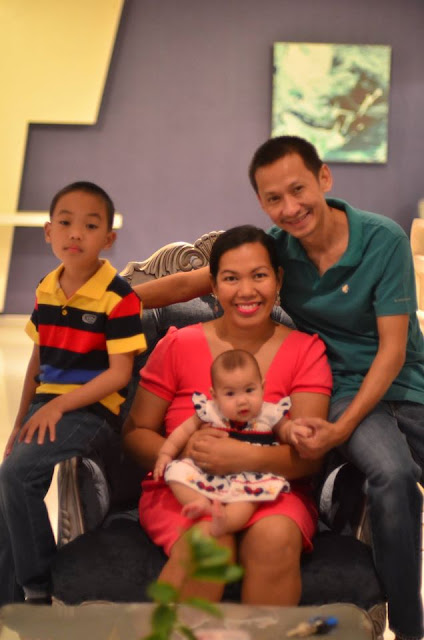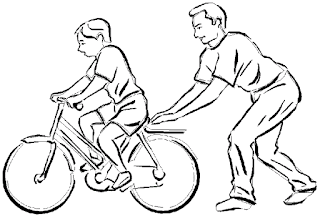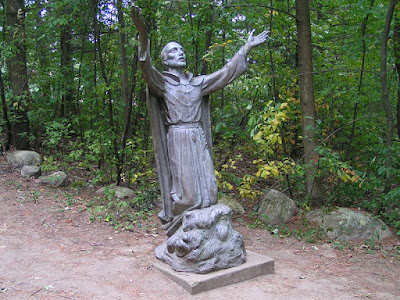Renante and Christine Alejo-Uy with Kiefer Thomas, their first born in 2007. At the time Renante and Christine were active members of Couples for Christ in Bacolod City, Philippines
The cover of Misyon, now MISYONonline.com, the magazine of the Columbans in the Philippines, November-December 2007.

Renante and Christine, 2015, with Kiefer Thomas now 8 and Ysabella Alexis 1. The couple are still involved with Couples for Christ but now in Thailand.
Readings (New American Bible: Philippines, USA)
Readings (Jerusalem Bible: Australia, England & Wales, India [optional], Ireland, New Zealand, Pakistan, Scotland, South Africa)
Gospel Luke 2:41-52 (New Revised Standard Version, Catholic Edition, Canada)
Now every year the parents of Jesus went to Jerusalem for the festival of the Passover. And when he was twelve years old, they went up as usual for the festival. When the festival was ended and they started to return, the boy Jesus stayed behind in Jerusalem, but his parents did not know it.Assuming that he was in the group of travelers, they went a day’s journey. Then they started to look for him among their relatives and friends. When they did not find him, they returned to Jerusalem to search for him. After three days they found him in the temple, sitting among the teachers, listening to them and asking them questions. And all who heard him were amazed at his understanding and his answers. When his parents saw him they were astonished; and his mother said to him, “Child, why have you treated us like this? Look, your father and I have been searching for you in great anxiety.” He said to them, “Why were you searching for me? Did you not know that I must be in my Father’s house?” But they did not understand what he said to them. Then he went down with them and came to Nazareth, and was obedient to them. His mother treasured all these things in her heart.

Christ Among the Doctors, Leonaert Bramer, 1640-45
Private Collection [Web Gallery of Art]
Today is the Feast of The Holy Family of Jesus, Mary and Joseph. On 19 March the Church celebrates the Solemnity of Saint Joseph, Spouse of the Blessed Virgin Mary. Today’s gospel refers to Joseph and Mary as the parents of Jesus. Mary says reproachfully to her Son, Look, your father and I have been searching for you in great anxiety. To the puzzlement of both Mary and Joseph, Jesus replies, Did you not know that I must be in my Father’s house?
St Matthew shows clearly the role of St Joseph in the life of Jesus: An angel of the Lord appeared to him in a dream, saying, An angel of the Lord appeared to him in a dream and said, “Joseph, son of David, do not be afraid to take Mary as your wife, for the child conceived in her is from the Holy Spirit. She will bear a son, and you are to name him Jesus, for he will save his people from their sins” (Matthew 1:20-21).
Joseph’s first responsibility was to be the husband of Mary and, as such, was to name her Son, thereby becoming his legal father. In some paintings of the Nativity St Joseph is a background figure, or partly hidden in the dark, but clearly protective of Jesus and Mary, and in an attitude of worship towards the Infant.

The Nativity, El Greco, 1603-05
Hospital de la Carridad, Illescas, Spain [Web Gallery of Art]
But in depictions of the Flight into Egypt, of which there are many, we often find St Joseph leading the way, as in this woodcarving.

The Flight into Egypt, Unknown Flemish Master, c. 1515
Riksmusesum, Amsterdam [Web Gallery of Art]
The Greek-born Doménikos Theotokópoulos, (1541 – 7 April 1614) who settled in Toledo, Spain, as a young man where he became known as ‘El Greco’, ‘The Greek’, captures the role of St Joseph as a protective parent.

St Joseph and the Christ Child, El Greco, c.1600
Museo de Santa Cruz, Toledo, Spain [Web Gallery of Art]
As a child I saw my parents as my father and mother. Now I remember them not only as that but as a married couple. And sometimes I think that the Church over-emphasises the importance of the family at the expense of marriage, which is the foundation of the family. St Joseph’s primary responsibility was to be the husband of Mary and, as such, to be the one known as the father of Jesus, even though Mary’s Son wasn’t his.
And in today’s gospel Mary painfully discovers that, in a sense, he isn’t hers either, as he says, Did you not know that I must be in my Father’s house? At the beginning of his adolescence Jesus was, in his humanity, coming in touch with his heavenly Father’s will. The mystery of Jesus being both God and Man is something we cannot fathom. St Paul says that Jesus though he was in the form of God, did not count equality with God a thing to be grasped (Philippians 2:6).
But this incident shows us that Mary and Joseph as parents suffered the same pain that every parent of an adolescent goes through. They were learning that they did not ‘own’ Jesus, that they would have to let him go at some stage.
I recall some incidents involving my father. One was when I was no more that three, possibly only two. Like St Joseph, he was a carpenter and made a little saddle that he put on the crossbar of his bicycle, on which he went to work every morning. I recall him taking me for a ‘spin’, probably on a Saturday afternoon, in the area where we lived at the time, I sitting joyfully on the little wooden saddle he had made. It’s like a photo in my mind that captures a moment of delight between father and son.
Then when I was around ten he taught me how to ride a bicycle. I borrowed that of a cousin a little older than me. Dad held the back of the saddle tightly so that I wouldn’t lose balance and stayed with me patiently. Then at a certain point I realised that he wasn’t holding it anymore and that I was moving forward without falling. He knew when to let go.

[Source: Coloring-pictures.net]
He taught me how to swim around that same time, with the same approach. He gave me a sense of security – but didn’t cling on when I didn’t need that kind of security anymore.
My parents taught me what trust was by trusting me. In Ireland the symbol of adulthood was – and maybe still is, I don’t know – the key to the house. I was given the key when I was only 13. None of my friends had that privilege. Even on one occasion three years later when I came home very late on my bicycle from a dance and they were waiting at the door sick with worry – nobody on our street had a telephone and mobile phones probably weren’t even in the imaginations of science-fiction writers – all I got was a well-deserved scolding. They still trusted me to use my key responsibly.
I saw too that on occasions when there might be a combination of heat and coldness in their relationship for a few days, they still took care of each other. After attending a very early Mass Dad would come home, prepare my mother’s breakfast and bring it to her in bed before heading off for work. And when he came home in the evening his dinner would be always ready. I remember his amusement on the only occasion in their married life when my mother didn’t have it ready. She had been delayed by something unexpected and was really embarrassed. Dad just laughed.
In Worldwide Marriage Encounter one of the things we emphasise is that Love is a Decision. It’s not a feeling, though feelings are related to it, of course. I saw that in my parents’ lives and I also saw that they made important decisions together. One example was when I was 13. My father was asked to take on a job for six months in a town in the south of Ireland. This meant that he would be able to come home only one weekend per month. I know that my parents discussed this thoroughly and also spoke to us, their two sons, about it, before deciding that Dad should take on the job.
This cartoon, which I found on a friend’s Facebook, captures in a humorous way what Love is a Decision means. (I think that the cartoon has been been to many places in cyberspace.)

As I look back now, I see clearly that my parents were husband and wife first, and father and mother second. That did not mean that they saw parenthood as being of lesser importance but that they saw it as being a consequence of being married. I think they had their priorities right.
The Feast of the Holy Family reminds us that marriage is the root of the family. Do not be afraid to take Mary as your wife, for the child conceived in her is from the Holy Spirit. She will bear a son, and you are to name him Jesus, for he will save his people from their sins” (Matthew 1:20-21).
The liturgical Season of Christmas continues until the Feast of The Baptism of the Lord on Sunday 10 January. The Huron Carol was written by St Jean de Brébeuf SJ in 1623 and set to a French folk tune. Jesse Edgar Middleton translated it into English in 1926. St Jean, a Frenchman, was martyred in Canada on 16 March 1649.
Twas in the moon of wintertime when all the birds had fled
That mighty Gitchi Manitou sent angel choirs instead;
Before their light the stars grew dim and wondering hunters heard the hymn,
Jesus your King is born, Jesus is born, in excelsis gloria.
Within a lodge of broken bark the tender babe was found;
A ragged robe of rabbit skin enwrapped his beauty round
But as the hunter braves drew nigh the angel song rang loud and high
Jesus your King is born, Jesus is born, in excelsis gloria.
O children of the forest free, O seed of Manitou
The holy Child of earth and heaven is born today for you.
Come kneel before the radiant boy who brings you beauty peace and joy.
Jesus your King is born, Jesus is born, in excelsis gloria.

St Jean de Brébeuf, Martyrs’ Shrine, Midland, Ontario, Canada [Wikipedia]
Canada celebrates Christmas in the depths of winter but Australia celebrates it in high summer. Just now I came across this delightful Australian carol, The Three Drovers, composed in 1948 by John Wheeler and William G. James. These drovers would be the Australian counterparts of the shepherds who went to the stable in Bethlehem on the first Christmas night.
Across the plains one Christmas night
Three drovers riding blithe and gay,
Looked up and saw a starry light
More radiant than the Milky Way;
And on their hearts such wonder fell,
They sang with joy. ‘Noel! Noel! Noel! Noel! Noel!’
The air was dry with summer heat,
And smoke was on the yellow moon;
But from the heavens, faint and sweet,
Came floating down a wond’rous turn;
And as they heard, they sang full well
Those drovers three. ‘Noel! Noel! Noel! Noel! Noel!’
The black swans flew across the sky,
The wild dog called across the plain,
The starry lustre blazed on high,
Still echoed on the heavenly strain;
And still they sang, ‘Noel! Noel!’
Those drovers three. ‘Noel! Noel! Noel! Noel! Noel!’

